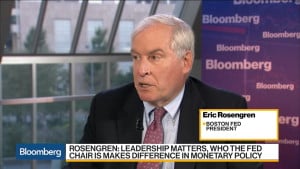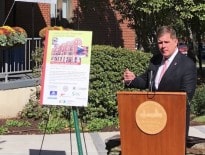The president of the Federal Reserve Bank of Boston expects to see one more gradual interest rate hike in December and another three in 2018.
Speaking at a conference in Boston Friday, Eric Rosengren said he also expects current low inflation, the main factor that could hamper projected interest-rate hikes, to get much closer to the Fed’s 2 percent target next year.
“My worry is that we get to a place that is unsustainable, and that can be reflected in wages or prices starting to go up too quickly, or it can be reflected in asset prices going up too quickly,” he said in an interview with Bloomberg at the conference. “What we want is a sustainable recovery and that would imply keeping the unemployment rate fairly close to what we expect full employment to be.”
The Fed has been hiking the short-term interest, which now sits between 1 and 1.25 percent, throughout the year, and recently began unwinding its $4.5 trillion balance sheet it built up following the financial crisis.
But low inflation – which the Fed and Rosengren projected last year would get to the desired 2 percent mark this year, but sat at 1.3 percent as of August – has puzzled Fed officials and could lead to slowing efforts to boost growth.
Rosengren said he thinks temporary factors such as the recent devastating hurricanes and wireless pricing changes may have impacted the Fed’s inflation projections.
“What we are trying to get is the underlying trend in prices. There can be relative prices that change a lot. That is why we focus on core inflation rather than total inflation,” said Rosengren. “We are not trying to address all the relative price changes that occur in the economy. We are trying to get that underlying rate.”
If inflation continues to buck projections, Rosengren said one potential reason the Fed would need to continue to explore is the impact of greater globalization, although he still thinks its too early.
But with the Boston Fed projecting 2.5 percent growth and the employment rate at 4.2 percent and potentially dipping below 4 percent in the future, it makes sense to continue to raise interest rates to keep pace with growth, he said.
Rosengren said CEOs he speaks with in his district are starting to see wage pressure, where jobs that are typically not hard to fill such as bank tellers in short supply.
Overall though, he is concerned that low rates for a long period of time pushes households and firms to reach for yield and therefore take on more risk, leaving them less prepared should there be a negative shock on the economy.
In Boston, Rosengren sees high commercial real estate valuations as a microcosm of an issue the entire country is dealing with in today’s economic climate.
“The Boston economy is doing quite well, but I would say there is a lot of commercial real estate going up in Boston and an unemployment rate that is getting quite low,” he said. “So, some of the things I worry about in terms of sustainability in the long run are reflected in how well the Boston economy is doing in the long run.”




 |
| 


